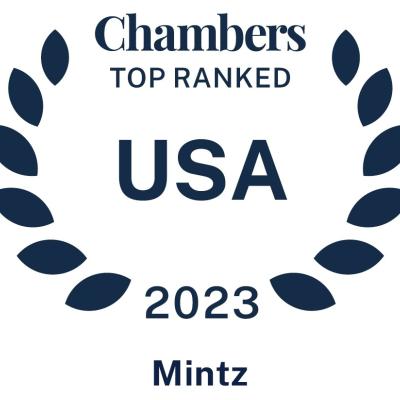
International Trade Commission Section 337
Rapid Resolution of Intellectual Property Conflicts
Mintz attorneys represent complainants and respondents in Section 337 investigations at the U.S. International Trade Commission. Our team successfully handles patent, trade secret and trademark matters in this fast-moving venue which can harness the power of U.S. Customs and Border Protection to ban import to the U.S. of infringing products. This relief is much sought after by companies seeking to defend their innovations, and is a significant threat to importers which are accused of infringing intellectual property.
Share AwardsOur Experience
 Case Study
Case Study
 Case Study
Case Study
 Case Study
Case Study
Our Approach
To achieve success at the ITC, an attorney must understand the unique nature of the venue. Intellectual property litigation at the ITC is very fast-paced – investigations typically take less than 18 months – with complex procedures, Administrative Law Judges with great expertise in intellectual property disputes, global discovery, and unique substantive requirements, including the “domestic industry” requirement.
Complainants must come to the ITC highly prepared. There will be no time for the complainant to learn its own case – proactive preparation before the complaint is filed is essential. This is especially true with respect to ITC-specific issues such as importation and satisfaction of the domestic industry requirement. The ITC has unique tools that allow for powerful domestic and international discovery. But for these tools to be effective, careful planning – and knowledge of domestic and foreign enforcement rules – is essential. The Complainant also must have a preemptive strategy to drive the case to an effective remedy, anticipating possible public interest considerations that are unique to this venue.
As a Respondent you will be playing catch-up against the Petitioner and have a short window in which to develop a defense to maintain the right to compete in the US market. The Complainant will have had ample time to prepare the complaint, while you will be learning the case in real time. Nevertheless, there are many procedural opportunities for Respondents to take the initiative and the fight to the complainant. Early development of redesigns and challenges to the complainant’s case in chief – such as through use of the ITC’s “Pilot Program” to address case dispositive issues in 100 days – can allow Respondents to control their destiny.
The Mintz team brings to the table an unmatched bench of legal, strategic and tactical experience in the prosecution and defense of ITC cases.
- Powerful, injunction-like remedies: Exclude infringing products from importation to or sale in the US, and obtain powerful cease and desist orders preventing the domestic sale and distribution of the accused products.
- Rapid adjudication: Investigations take 18 months from filing to verdict as compared to years in district courts
- Nationwide and worldwide subpoena and enforcement powers
- Specialized IP Focus: Patents, Trade Secrets and Trademarks all enforceable with potential for importation bans
- Specialized Administrative Law Judges highly experienced with IP cases
- No Joinder Restrictions: Multiple parties as respondents in a single investigation without joinder restrictions
- Import Ban: Loss could block importation of products to world’s largest market
- Remedial Order Mitigation: The ITC’s procedural nuances can allow prepared Respondents to mitigate the effects of potential remedial orders, such as through the prompt adjudication of redesigns and unilateral consent orders
- 3rd Party Impact on Remedial Orders: In some cases, the timely mobilization of third parties and customers can have a significant effect on the scope of remedial orders
- Venue Moves Fast: Speed of the venue puts tremendous pressure on Respondents – but Respondents need only win on one issue
- Technical Defenses Welcome: Knowledgeable Administrative Law Judges mean technical defenses have a willing audience
- Strong Protective Orders: Confidentiality ensured through a strictly policed, single level of protective order (highest)
- One of very few firms ever to have achieved a General Exclusion Order in a 337 investigation
- Knowledge of and experience with the ITC staff attorneys who are critical to success, including a partner who previously worked in the OUI office
- Among most active firms in the ITC and handling IP cases in the venue for more than 15 years
- Teams structured for maximum success based on extensive experience in the venue
- Successful representation of parties on both sides of ITC investigations
Unambiguous and historical data shows that the International Trade Commission’s statutory economic prong of the domestic industry requirement remains consistently favorable to complainants. Despite the recent perception that the requirement is becoming harder to satisfy, this data shows that there is no growing risk that ITC complainants will be unable to meet it.

What Our Clients Are Saying
Our Insights
Viewpoints













